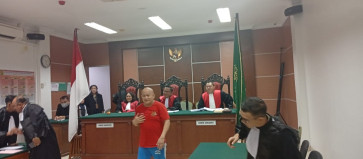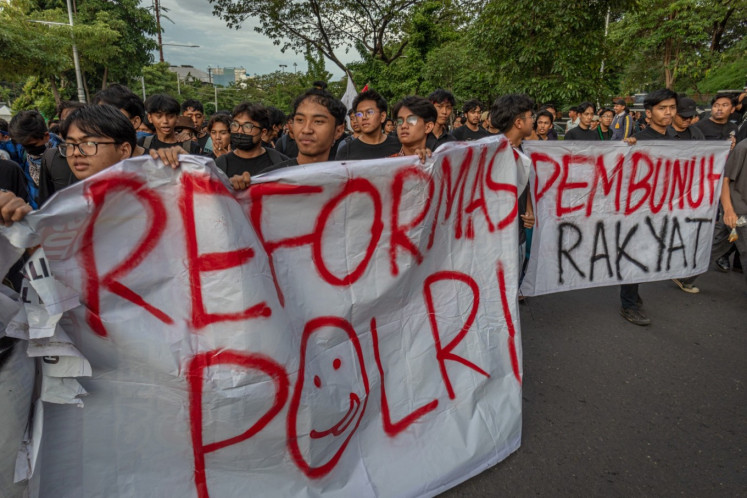Popular Reads
Top Results
Can't find what you're looking for?
View all search resultsPopular Reads
Top Results
Can't find what you're looking for?
View all search resultsPapuans preserve ‘noken’ as a way of life
Local style: Jayapura Regent Mathius Awoitouw (left) has a conversation with civil servants at the regency’s administration recently
Change text size
Gift Premium Articles
to Anyone
L
span class="caption">Local style: Jayapura Regent Mathius Awoitouw (left) has a conversation with civil servants at the regency’s administration recently. The administration requires all civil servants in the regency to wear Papuan batik and noken (traditional woven bag) every Wednesday.(JP/Nethy Dharma Somba)
“Don’t claim yourself as Papuan if you don’t have a noken,” said Klemen Tinal, deputy governor of Papua.
He was referring to a knotted net or woven bag made from wood fiber or leaves by communities in Papua and West Papua province, which was included on UN Educational, Scientific and Cultural Organization (UNESCO)’s intangible cultural heritage list in 2012.
“Noken is only found in Papua. There is no other place in this world where people make noken. That is why UNESCO listed noken as an intangible cultural heritage,” he said.
Noken in Papua take various forms and colors, but they are always made of materials taken from nature, such as orchid stalks, sago leaves and bark.
“Every area in Papua has different models and characteristics of noken. In Mee Pago, for example, noken is made of orchid stalks, and only Mee Pago people are able to create noken out of orchid stalks.”
Noken is also an important part of the lives of Papuan people.
Papua, consisting of Papua and West Papua, is the only region in the country, which is allowed to use a special voting system, using noken, in elections.
In the noken system, residents conduct a gathering, locally known as musyawarah, which brings everybody together to make decisions by consensus. Voters do not go to polling stations to vote. Instead, tribal leaders visit the TPS to lodge votes, which represent every member of their respective communities.
Noken in coastal areas will be different from mountainous areas, although they have similar functions.
Men and women use it for carrying plantation produce, their catch from seas or lakes, firewood, and even babies or small animals, as well as for shopping and for storing things in the house.
“Noken is like a cloth for Papuan women. They use it everywhere they go,” Tinal said.
In Papuan culture, mothers teach their daughters to create noken, while fathers teach their sons to hunt. Mothers will create noken for each family member.
“This is my noken, made by my mother. I bring it everywhere I go,” Tinal said.
The deputy governor’s noken is made of bark and was naturally colored with a combination of black, red, white and yellow.
Papuan noken is known worldwide, Tinal said, but has to be consistently promoted. He promotes noken by giving it as souvenirs for his guests, both official and private.
“I always have a stock of noken, so I can give it away as a memento. And I always bring it as a souvenir when I travel outside Papua. And I will talk about noken in front of other people whenever I have the opportunity. That’s my way of promoting and preserving noken.”
Noken is only created by Papuan mothers so buying noken helps improve the local economy.
“In the traditional life of Papua, mothers are the breadwinners of the family. By buying noken, we help their economy,” Tinal said.
Tinal also intensely promotes noken through his Facebook account, Galery Klemen Tinal, where there are many photos of noken and a status that reads, “Don’t claim yourself as Papuan if you don’t have a noken.”
He said the provincial administration planned to organize a noken festival to provide an opportunity for noken crafters to promote their creations.
The creative process of making noken will also be incorporated in school curriculums, so that younger Papuan generations will inherit the skills of creating noken and will be able to preserve it.
As the popularity of noken grows across the years, there have been a rising number of mothers and girls in Papua selling noken along the sides of main streets.
The prices vary, starting from Rp 100,000 (US$7.5) each to millions of rupiah.
“This one is sold for Rp 2 million. It’s originally from Dogiyai, and made of orchid stalk,” said Mia, a noken seller on Abepura street.










